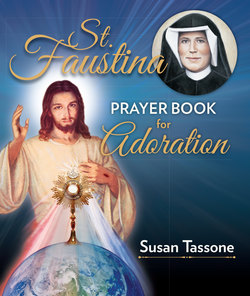Читать книгу St. Faustina Prayer Book for Adoration - Susan Tassone - Страница 8
На сайте Литреса книга снята с продажи.
ОглавлениеA Personal Note from the Author
Dear Friends,
You were created by God for adoration. In your heart and in your soul. (As St. Augustine wrote, “You have made us for yourself, O Lord, and our hearts are restless until they find their rest in you.”)
You, with your unique, literally one-of-a-kind relationship with God — because He made you unique, literally one of a kind. Body and soul.
And God. Infinite. Eternal All-loving. Calling you, inviting you, to spend time with Him. Just you and Him. Not equals, but Creator and created being He chose to create. The one He had in mind, not just since you were conceived but forever.
Quite the pair. God, your Heavenly Father. And you, created for heaven.
But what does “heaven” mean when it comes to adoring God? Is it kneeling forever before God while repeating “Hosanna”? And, be honest with yourself, does that sound “heavenly” to you?
That’s it? Forever?
What about the “beatific vision”? Another description. Eternity … looking at God?
The Catechism of the Catholic Church offers a more detailed description:
This perfect life with the Most Holy Trinity — this communion of life and love with the Trinity, with the Virgin Mary, the angels and all the blessed — is called “heaven.” Heaven is the ultimate end and fulfillment of the deepest human longings, the state of supreme, definitive happiness.
To live in heaven is “to be with Christ.” (CCC 1024–1025)
Why bring that up here, at the beginning of a book on adoration? Because it can be easy, especially in the early stages of this form of devotion, to think of it as just kneeling before a tabernacle or monstrance. Just staring at the receptacle holding Our Lord in the Eucharist. Just watching the minutes slowly pass.
St. Faustina says, “Not so.” Yes, she knelt. Yes, no doubt, she stared. Yes, time passed but … too quickly.
The young nun was living “in heaven,” in that Polish convent. In that chapel or on her sick bed when she made a “spiritual adoration.” It was there that she adored Our Lord. It was there that she found, for a too-brief time each day, the Most Holy Trinity, Our Lady, the angels, and the saints.
What she describes in her diary is, literally, heaven on earth.
It’s what God offers you. What He offers to share with you.
Probably not visions and voices, but graces and blessings. Sometimes wordless nudges or startling insights. Certainly joy. And peace. A bit of heaven on earth for you. You and God, together.
And it could be that when the time comes for you to leave earth, to enter heaven, it will be a gentle transition. It will be a familiar “place” — or rather, state of being — because you’ve visited it before, time and again. Or more accurately, God brought it when He visited with you, time and again.
How do you get closer to that ideal in your own acts of adoration? The same way you move forward in ordinary tasks or in virtue. No miracles. Just practice, perseverance, patience, and prayer.
And just as there are others who have gone before you, who can help you with life in general — parents, teachers, mentors, and so on — those who have become more proficient at adoration want the same for you.
St. Faustina wants the same for you. That’s what this book is about. Yes, it includes her extraordinary experiences, but also her advice and example. Just how central was adoration to her life as a religious? It was her life. Period.
Young Helena Kowalska was given the religious name Sister Maria Faustina. But years later, God may have tipped His hand just a bit when He called her to add “of the Most Blessed Sacrament.”
She was His. And He was hers. Eternally.
You’ve been on my mind as I wrote this book. As I made my own visits of adoration before Our Lord in the Blessed Sacrament. As I researched, learned about — and marveled at — St. Faustina’s growing closer and closer to Jesus. At her becoming more and more like Him.
During my visits, the beauty, power, and grace of adoration became clearer to me. With that, a deeper realization that God is truly there, in the Eucharist.
And as I wrote this book, as I spent time in adoration, you, your loved ones, and the souls of your dearly departed have been in my prayers.
Please pray for me and mine.
St. Faustina, pray for all of us. St. Faustina, pray with each of us. Amen.
— Susan
